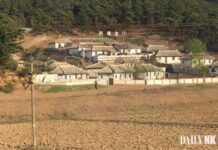Calls have again been made for civilian short-wave broadcasters focusing on North Korea issues to be allocated frequency in South Korea for the purpose of enhancing efforts to improve North Korean human rights.
A senior researcher with the Hansun Foundation for Freedom and Happiness, Lee Young Hwan told a conference for political, religious and other social organizations to discuss new policies regarding North Korea, “We need to come up with a real plan regarding unification and diplomacy that will actually do something for the human rights of our brethren in North Korea.”
Lee went on, “Those currently broadcasting on North Korean issues in this country have never been assigned a frequency, and as such they rent frequency abroad,” before emphasising, “We need to make it so that these civilian broadcasters on North Korea actually have a frequency to use.”
He also spoke of the need to “Overcome difficulty and be patient in pursuing liberation of broadcasting in both countries, and finding a route for the peoples of North and South Korea alike to be able to freely listen to whichever broadcasts they choose.”
The conference was attended by people from all sectors of society, including left- and right-wing politicians, representatives of Christian and Buddhist groups and other social organizations, all gathering together to discuss the direction of future unification policy.
The standing president of the KCRC, Kim Deok Ryong said in his opening address, “Conservative and progressive sides of politics both have the same objectives when it comes down to it. We are all here to search out a new paradigm for the continuing and forward-looking direction of North Korea and unification policy through rational discussions and debate.”
Below is a summary of some of the other highlights of the conference.
▲ Choi Dae Seok (Chief Researcher, Institute for Unification Studies, Ehwa Women’s University)
“A large problem is that the stance of principled engagement completely collapsed starting with the Kim Dae Jung administration, while the current government has lost the momentum created from several decades of policy through its overemphasis on unbending principles. In creating a position of principled engagement, the most important thing is to balance what is in the best interests of the Korean people with those of the state.
In the short term a stance of principled engagement means expanding inter-Korean exchanges through humanitarian aid and other means, while in the medium to long-term we must work to exert continuous pressure on the nuclear issue and other problems affecting relations between our two countries.”
▲ Park Joo Seon (Democratic Party National Assembly lawmaker)
“China has been consistent over the last ten years in its support for Korea’s ‘Sunshine Policy’ and policy of engagement towards North Korea. China’s support allowed South Korea to wield further influence in the US-ROK alliance, relations with North Korea and at the Six Party Talks. There is a need for a sophisticated and creative effort to convince China to support our policy initiatives.”
▲ In Myeong Jin (Priest, Galilee Church)
“The next two to three years are a crucial time in inter-Korean relations. For this reason the Lee Myung Bak administration must work to establish an environment in which it can achieve some sort of ‘grand bargain’ before it is too late. The environment could be created by normalizing humanitarian aid, restarting tourism to Mt Geumgang and abolishing the May 24 Measure. If trust between the two Koreas can be built up through these initiatives a grand bargain will be possible.”
















